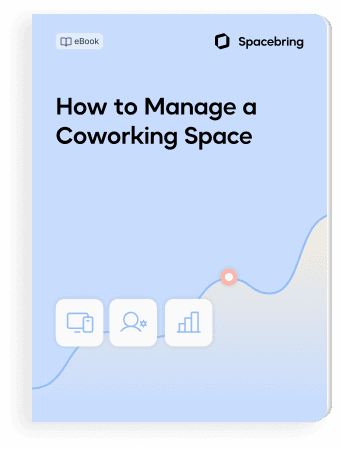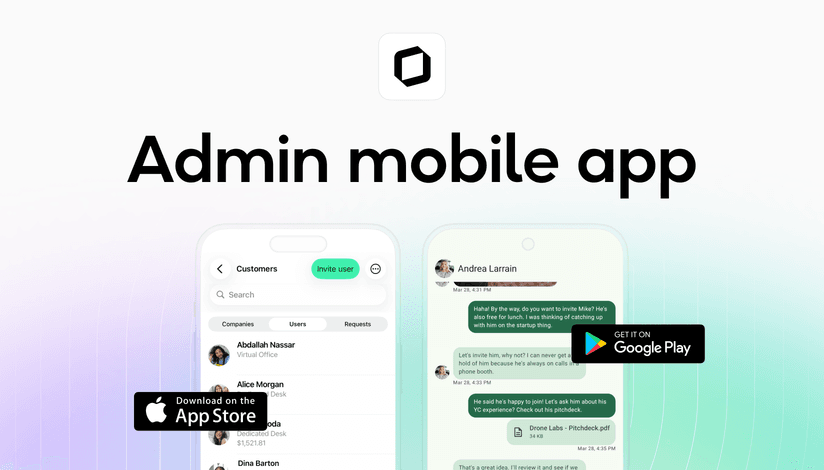Recent years have seen a shift from traditional work methods to remote/hybrid formats and Statista report estimates that the number of people using coworking spaces will double by 2024, equaling approximately 5 million people.
If you own a coworking space, it’s time to revisit your business process maps, as guidelines and rules are essential to manage a coworking space and make it a productive place for all.
Why Do Remote Workers Love Coworking Spaces?
Coworking spaces offer numerous benefits to remote workers or small business owners looking for a well-equipped and aesthetic workspace, such as flexibility and amenities like conference rooms, and even a phone system for small business.
There’s also an assortment of people. You’re likely to find a business owner discussing inventory management strategy with a marketing professional from another company and vice versa.
Coworking Space Etiquette Explained
With so many different people all working in the same space it’s important to remind them of a few fundamental guidelines that will encourage a sense of community overall, including
7 Essential Things to Include in Your Coworking Space Guidelines
Here are some rules, tips, and guidelines you can add to your coworking space rulebook:

1. Stay professional
Coworking spaces can be casual spots. The décor is usually catered towards all kinds of professionals, whether freelancers or remote workers. This can create some confusion over boundaries. People might forget that they’re in a workspace and their behavior needs to reflect certain professional ethics.
It’s important to remind members that they should abide by some professional rules. Some of these include keeping their music volume low, not talking too loudly on phone calls or otherwise, and maintaining a personal boundary. It can be tempting to sit and chat with a fellow worker over coffee but such discussions should veer towards the professional and not involve personal drama.
There can be a spillover if coworkers try to feel too at home in the space. Maintaining these boundaries is essential if everyone wants to get their respective work done. You can let members know that if they face issues in the space, they can reach out to a member of the staff for solutions. Your company’s privacy policy will go a long way to assure them that their matter is being dealt with discreetly. This keeps a nice line between any drama being started in the space.
2. Use, don’t bombard
Coworking spaces offer a lot of utilities that members can use. Things like coffee carts, snack bars, high-speed Internet, charging stations, workspaces, and more are usually available to be used by anyone. It’s important that customers understand that these perks are for common use and shouldn’t be monopolized or used in a messy way. The last thing you need in your space is a spillage, wastage, or electronic failure.
This rule applies to shared spaces like bathrooms and common areas too. These spaces should always be kept clean by members and, on your end, should be repaired regularly. No one wants to use a bathroom that’s flooded or shabby. Draft or download a release of liability template to keep yourself in the clear in case a visitor causes someone else to get injured in these spaces.
3. Participate in common events
The best coworking spaces are where people develop a sense of community and belonging. Encourage members to mingle with each other, especially during networking events or workshops. There might be people who come in and keep to themselves. While this isn’t a terrible state of affairs, it might deflate the sense of community that’s essential to good coworking spaces.
You can gently encourage members to talk to each other, share skills or tips about work, and build a community. Note that community-based events such as trips might require guests to sign liability waivers. This is so the company doesn’t find itself on the short end of a misplaced lawsuit. You can draft a waiver agreement template to ensure that community events remain accessible and fun for everyone.
4. Don’t spam
Speaking of community, there’s a chance that your space attracts eager and enthusiastic people who want to be extra social. There’s nothing wrong with wanting to make a lot of connections in a coworking space, but members should maintain certain boundaries. You can remind people to avoid spamming their fellow remote workers with personal updates, events, or opinions unless absolutely necessary.
5. Respect the message board
Clear communication is always encouraged and you can play your part through a creative message board. Install a cork or leather message board in a prominent area like the common room or near the kitchen. This way, people can add their own messages, posters, flyers, and notes. These can be buy-and-sell ads, people offering services, freelancers looking for gigs, and more. Not only will you give people a chance to earn more money but you’ll also give them the opportunity to make more friends.
Post a few rules next to the message board, though. These will serve as gentle reminders to help coworkers understand what and how to post. The board shouldn’t be weighed down with unnecessary notices or papers. You can post a clear set of guidelines that define what members should and shouldn’t put on the board to keep everything neat and relevant.
6. Stick to schedules
When members and visitors sign up for slots in the space, it’s a common courtesy to stick to them. It makes life inconvenient for other people if workers are late or overbook slots throughout the day. It’s equally frustrating for you if you can’t predict who will show up and when. Keep rules in your guidebook about only booking the space when someone is sure about their time slots.
The communal vibe can be affected if certain members are flaky because they will also skip out on key networking events and workshops. Make sure that you politely talk to whoever doesn’t adhere to a set schedule or someone who cancels at the last minute.
7. Be comfortable but professional
The best thing about working from a coworking space instead of an office or home is the flexibility. Guests can book their slots whenever they want and stroll in wearing casual outfits and well-fitted suit. They can unwind while doing their work and socialize with different people. It creates a fun vibe around the space when different people are doing their own thing.
This doesn’t mean that there shouldn’t be a dress code. While some coworking spaces might be okay with guests wearing sweatpants, there are certain articles of clothing that should be discouraged. It’s supposed to be a largely professional setting and your guidelines can suggest this.

Dreaming of hassle-free coworking space management?
Final Thoughts
There are a lot of benefits to reap from working in an aesthetic coworking space. Coworkers should understand that they should give in order to get back. This applies to intangible aspects like socialization, networking, and business advice too. It’s in poor taste to pick someone’s brain when you need help but not be available for help when they need the same support from you. You can put up reminders around the space to encourage members to socialize with boundaries and help each other out.
Another issue that you might run into is flaky members who can’t be relied upon to show up at agreed-upon times. A good solution for this is to allow them to visit the space on a trial basis. If someone keeps switching their appointments randomly, you’ll know they’re likely to continue doing that in the future.
Keeping a note of all these factors as you create an unofficial or official guidebook for your coworking space will help maintain decorum and a thriving sense of community. Consider a coworking space management platform that can help enforce these guidelines and cultivate a culture that promotes an engaged community.
The article was written by Yauhen Zaremba. Yauhen is the Director of Demand Generation at PandaDoc, all-in-one document management tool for almost all types of document including this free roofing contract template. He’s been a marketer for 10+ years, and for the last five years, he’s been entirely focused on the electronic signature, proposal, and document management markets. Yauhen has experience speaking at niche conferences where he enjoys sharing his expertise with other curious marketers. And in his spare time, he is an avid fisherman and takes nearly 20 fishing trips every year.






